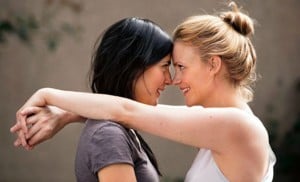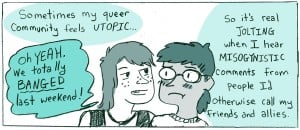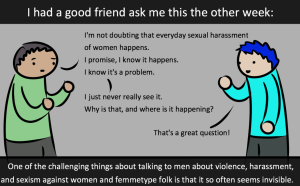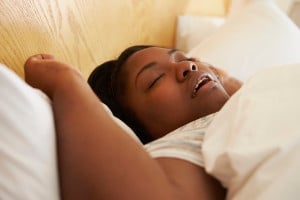
A person making a pouting expression and tugging at a piece of hair between two fingers.
“You seem like a very sexual person.”
A few years ago, I probably would’ve said “yes, I am” in response to this comment from someone I’d recently met and told I write about sex and relationships.
In fact, I used to self-identify as “a very sexual person” – until I realized that’s what we call women just for being sexual, period.
I get a lot of comments like this for doing nothing out of the ordinary. People have assumed I have a ton of sex just because I admit to enjoying sex, that I’m super kinky because I own sex toys, and that I’m into casual sex because I talk about sexuality.
When people call me “a very sexual person,” what they’re really saying is that they didn’t expect me to be sexual at all. So, any level of sexuality I express seems high to them.
A whole lot of sexist and heteronormative assumptions go into that reaction, since it’s based on a binary view of gender and sexuality that says men are sexual predators, women are prey, and sex exclusively occurs between men and women. While I don’t subscribe to this view, this article will be addressing it, since it affects how people treat me.
Here are a few myths about openly sexual women that lead to comments like “you seem like a very sexual person.”
1. We’re Unusual
One of the biggest myths about openly sexual women is that we just don’t exist. Yet many women and gender minorities are sexual beings, just like many men are. (Some are asexual, but then again, some men are.)
Our view of women as less sexual stems from our view of women as less human. Men are supposedly subjects of desire, while women are just objects of it. This applies not just to sexual desires but also to other desires, like the desire for career success or food.
Though desire is depicted as unfeminine, it’s really not related to gender.
If it seems like women are less sexual than men, maybe that’s because we’re not socially permitted to be. One study found that when women were told they would have a positive experience and not be judged, they were just as interested in casual sex as men.
Yet women still seem to make headlines just for admitting to having sexual desires. I once ended up in The Daily Mail simply for stating that I could simultaneously be interested in sex and wait until I was in a relationship to do it (and “insisting” my partners respect that).
Which leads us to this next myth.
2. We’re Interested In Casual Sex
Some openly sexual women are interested in casual sex, but some aren’t. Talking about sexual desires is one thing, and physically acting on them is another.
I don’t judge anybody for wanting casual sex. It’s just not usually for me, since physical and emotional intimacy tend to go together in my experience.
That doesn’t make me less sexual. It just means I’m more likely to be enjoying my sexuality with a long-term partner or alone.
Even if I didn’t have any sex, that wouldn’t make me less sexual either. You can be sexual in whatever way you want, even if it’s just in your thoughts and feelings. And contrary to what we’re taught, a woman does not need a man to make her a sexual being.
The idea that women who are openly sexual all want casual sex comes from the stereotype that we’re “wild.” This belief, in turn, stems from the virgin/whore dichotomy that says a woman is either a “good girl” who doesn’t have sex or is a “bad girl” who parties all the time.
A woman can both be sexual and care about connection with a partner. A woman can be sexual and be a devoted mother. A woman can be sexual and be devoted to her career. A woman can be sexual and be anything.
And even if she does have casual sex or party a lot, that isn’t “bad” or “wild.” It’s completely morally neutral.
3. We’re This Way To Please Men
Part of the reason people assume that women who are openly sexual are into casual sex is that they think we’re basically into whatever men want (and there’s unfortunately a stereotype that that’s all men want).
In many people’s minds, the only way for women to be sexual is for them to cater to men, since it’s not assumed that women have sexual desires themselves.
So, many people assume that I must engage in a lot of sexual acts that are typically depicted as ways to please men.
The whole notion of sexual “favors” is problematic in the first place because it implies certain sexual acts shouldn’t be mutual. Plus, the assumption that my sexuality exists for men is heteronormative, since not all women are interested in men.
There’s an even deeper issue, though: the assumption that women and their sexuality exist for other people.
This assumption comes out in the belief that a woman who has sex is up for anything. One friend of mine, for example, once hooked up with a guy and then found out he had “recommended” her to his friend. Another met two guys who told her they were arguing over which one she would sleep with, without her indicating interest in sleeping with any of them.
In both cases, the women’s attraction was deemed totally irrelevant, maybe because it didn’t occur to these men that women felt attraction or desire. This leads to the assumption that any sexual act they engage in would be for the sake of the men.
This belief can become especially dangerous when it leads to entitlement. For example, I once went home with a guy after a party who expected me to perform oral sex. He seemed genuinely confused that I could enthusiastically want to hook up and not want to do everything he wanted. I was doing this for him, after all, right?
Wrong. Women who have sex are often doing it for their own pleasure, because women have desires and pleasure themselves.
4. We’re Super Kinky
There’s nothing wrong with being into kink, but the assumption that all openly sexual women are is problematic – because it stems from the same virgin/whore dichotomy that leads people to assume we must also be into casual sex.
When it comes to sexuality, we tend to think of women as all or nothing. Either they’re very reluctant to have sex and not that into it, or they’re up for literally anything and everything (or, more accurately, anything and everything a man suggests – see #3).
When Amber Rose said she wasn’t into kink, hadn’t had a threesome or anal sex, and wasn’t into casual sex, The Daily Mail wrote about her “surprisingly tame sexual history.” But why would it be surprising when she’d never indicated otherwise? Because she’s open about sex, so people assume she’s sexually adventurous.
A woman can be completely vanilla and have a high sex drive, and someone can be super into kink and be less sexual. These things are not related.
***
We don’t really have these stereotypes about men who are open about sex. When male authors write about sex, it’s considered great literature, not “trash” as it is when women do. When men reference masturbation, people aren’t surprised because it’s already assumed that they masturbate.
Men who are openly sexual aren’t hypersexual or kinky or into casual sex or “wild”; they’re just people.
So why do we treat women who are open about sex as unusual?
The fact that we view women who are sexual as the exception reveals that we, by default, think of women as asexual. Or, more precisely, we think of them as “sexy but not sexual,” as Paris Hilton once described herself.
A woman who wants something other than to be wanted is a radical prospect. And it definitely should not be.
The idea that a woman’s sexual purpose is to be the object of men’s desires is incredibly damaging. It encourages sexual assault and eating disorders, and it sets women back in politics, the workplace, and every area where their advancement requires people to acknowledge what they want.
And when we promote stereotypes about sexual women, we encourage this idea.
So next time you think a woman seems like “a very sexual person,” ask yourself what you mean by that. Is she really particularly sexual, or is she just sexual? Chances are, it’s the latter, because there’s really no such thing as “particularly” sexual. All levels of sexual desire are normal.
And nobody should have to feel abnormal just for being honest about how they and their bodies work.
[do_widget id=’text-101′]
Suzannah Weiss is a Contributing Writer for Everyday Feminism and a New York-based writer whose work has appeared in The Washington Post, Salon, Seventeen, Buzzfeed, The Huffington Post, Bustle, and more. She holds degrees in Gender and Sexuality Studies, Modern Culture and Media, and Cognitive Neuroscience from Brown University. You can follow her on Twitter @suzannahweiss.
Search our 3000+ articles!
Read our articles about:
Our online racial justice training
Used by hundreds of universities, non-profits, and businesses.
Click to learn more




















